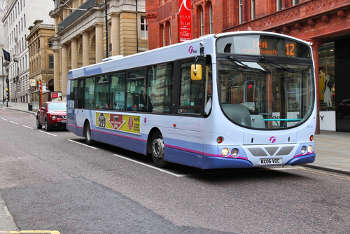Sir Richard Leese has said Manchester bus franchising plans will lean heavily on the London model, as the combined authority prepares to become the first outside to capital to end deregulation.
The deputy mayor of the Greater Manchester Combined Authority (GMCA) spoke to Transport Network after the consultation for the plans was released this week.

A FirstGroup bus in Manchester
The scheme would be delivered in phases at an estimated cost of £134m from now until 2024/25.
The first area would be delivered by April 2021, then a second by March 2022, then a third by March 2023, with the three areas then becoming one franchised market.
Sir Richard told Transport Network it was 'too early to say' how much funding the government would provide to support the move but said: 'We expect a substantial contribution from government particularly to take away any fear of local council tax payers that they will have to pay more.'
He added that once implemented it would be a 'significantly more efficient system' than the current deregulated market, where companies set their own fares and networks, while receiving subsidies if they operate unprofitable routes.
As a result, once up and running the franchising system would require no extra investment from Manchester authorities he said.
Previous attempts in the North East to end regulated markets failed in 2015 with the North East Combined Authority (NECA) told it could have to pay hundreds of millions in compensation to operators.
However the passing of the Bus Services Act gave new rights to local authorities, particularly directly elected mayors to deliver franchising.
Sir Richard told Transport Network there was no question of Manchester paying compensation to operators under to planned move.
Despite high profile opposition from Stagecoach, he added that no operator had so far refused to work with the combined authority and he didn't expect any boycotts.
If operators 'have a better idea', GMCA would love to hear it he said.
The planned model would reserve around 20% of the market for small to medium operators he said and that it would see the Greater Manchester market divided up between different operators rather than have just the one company given the franchise as is the case with the city's Metrolink tram network.
In London private companies are contracted to operate specific routes.
He also said he hoped to system would have smart ticketing from 'day one', with a smartcard and fare capping system already operating on Metrolink.
Under a franchising scheme, Sir Richard said some routes could see more frequency while some over-serviced routes - notably Wilmslow Road - could see fewer buses running on them.
GMCA would have to assess whether new routes could be provided depending on population density he argued and said that while major employment areas could see more services in the morning or evening there would not be a major expansion of 24-hour services.
Register now for full access
Register just once to get unrestricted, real-time coverage of the issues and challenges facing UK transport and highways engineers.
Full website content includes the latest news, exclusive commentary from leading industry figures and detailed topical analysis of the highways, transportation, environment and place-shaping sectors.
Use the link below to register your details for full, free access.
Already a registered? Login